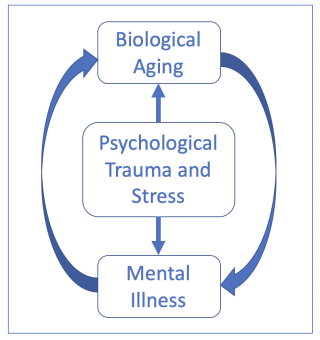- Folk wisdom suggesting that stress speeds up aging is increasingly supported by research.
- Stress and trauma can create a cascade of biological aging and mental health difficulties.
- Existing studies suggest that stressors alter the genetic material, which in turns changes the brain.
- Treatment and prevention efforts could help on two levels as they address both aging and psychiatric illness.

Folk wisdom tells us that major stresses can speed up the aging process, causing someone who has had a hard life to look older than their years. People often attribute going gray or losing their hair to a difficult job or stressful relationship; pictures of presidents before and after their terms in office tend to underscore that stress and aging go hand in hand.
Biological Markers Link Mental Health to Aging
There is now much research evidence to back up these impressions, according to a new article in the leading mental health journal JAMA Psychiatry. The author of the study, psychiatrist and research scientist Dr. Anthony Zannas, notes that various biological measures are linked to stress and mental illness.
Many of these measures are epigenetic variables such as telomere length and DNA methylation that affect how genes are expressed rather than the genetic sequence itself. These measures are tied to lifespan, health span (the amount of life spent in good health), as well as age-related diseases.
But it turns out that the causal arrow between biological age and mental health runs in both directions, such that biological aging can influence mental health. Other research has found that markers of aging significantly predict whether a person will develop PTSD after a trauma; those with the greatest signs of aging were 44 percent more likely to have PTSD at follow-up than those with the least signs of aging.
Similar results have been found for anxiety and depression, with markers of aging at baseline predicting depression and anxiety over the following 8 to 9 years.
Mutually Reinforcing Processes
Taken together, these processes can reinforce one another over time, creating a “vicious cycle,” says Zannas. Psychiatric illness leads to biological aging, which in turn increases the risk of more mental illness. The process is initiated by stress and trauma, which contribute to both biological aging and psychiatric illness (see Figure). Psychiatric illness contributes to additional aging, which likewise increases the risk for future mental illness.

Source: Seth Gillihan, adapted from Zannas (2024)
These genomic effects may then lead to changes in brain structure, such as:
- shrinking of the emotion and memory areas deep in the brain
- thinning of higher-level cortical areas, such as prefrontal regions
- small-vessel disease within the brain
Alterations in these brain regions would then predispose a person to psychiatric illness.
Possibilities for Prevention
Although the vicious cycle model paints a bleak picture for those who experience it, Zannas offers reasons for hope. First, he notes that treatments targeting mental health are likely to have a “twofer” effect, also reducing biological aging; the reverse could be true, as well. It is also possible that interventions that prevent aging could have positive effects on mental health, too.
The interventions could include medications and “neuromodulation” in which a device is used to change the activity of specific brain areas; for example, transcranial magnetic stimulation (TMS) uses magnetic pulses to alter brain activity in the areas to which it is applied. However, other interventions to prevent biological aging and protect mental health could be both simple and inexpensive, such as diet and exercise.
While much work remains to be done in this area, one take-home message is clear: Anything you can do to guard your physical and emotional health is likely to pay big dividends in helping you to live a longer and happier life.
References
Zannas, A. S. (2024). Biological aging and mental illness—a vicious cycle? JAMA Psychiatry.
